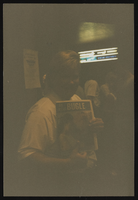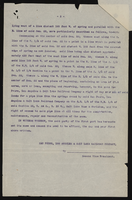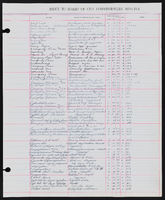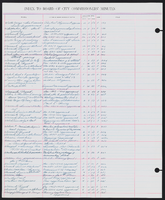Search the Special Collections and Archives Portal
Search Results

Transcript of interview with Harry Sax by Barbara Tabach, April 8, 2015
Date
Archival Collection
Description
Interview with Harry Sax by Barbara Tabach on April 8, 2015. In this interview, Sax discusses his family history and upbringing in Chicago, and his military service in Munich. He returned to Chicago and became business partners with Michael Schulson, with whom he opened several Arby's outposts, and expanded to Las Vegas in 1968. He talks about life in Las Vegas in the 1970s and the competition in the fast food industry. He then talks about the reform congregation in Chicago and his connection to Judaism throughout his life. He describes himself as a "closet Jew" before becoming president at Congregation Ner Tamid in 2007. Sax discusses the programs at Ner Tamid for all ages, and his continued involvement in the community.
In 1939, Harry Sax was born in Chicago, Illinois, the son to first generation American Jews. He spent his childhood on Chicago's South, where his family belonged to a progressive Reform congregation. After graduating from Hyde Park High School, he continued his education at Indiana University. In college, Harry was a member of the ZBT Jewish fraternity, participated in a singing group, and was a cadet in the Reserve Officers' Training Corps. Upon graduating from college, Harry was stationed in Munich, Germany as a second lieutenant in the Quartermasters Corps. In addition to his required military duties, he also participated in an after-hours acting group; through this group, he was hired as an extra and for small roles, including The Great Escape. When he finished his service, Harry returned to Chicago, where he connected with a high school friend, Mike Schulson. The two became partners and purchased Arby's franchises in Chicago and Las Vegas. Thus, in 1968, while his partner remained in Chicago, Harry moved to Las Vegas and opened two franchise locations in two weeks. Though it took a few years to stabilize the business and overcome competition, he opened a third location in 1972 on South Decatur, what was then the western edge of the city. Today, Harry has nineteen locations in Las Vegas, with additional franchises in Reno and Barstow, California, and employs nearly 300 people. After about twenty years as a "closet Jew" in the city, Harry reconnected with Judaism and joined Congregation Ner Tamid in the late 1990s. He served on its board, eventually becoming vice president and then president (2007-09). He also dedicated himself to have a bar mitzvah, following up on his Jewish education and confirmation as a teenager. Harry has also served on the Anti-Defamation League's board as well as an active member of the Chamber of Commerce.
Text

"The Incredibly True Adventure of Two Girls in Love" film screening in Las Vegas, Nevada: photographic prints, image 008
Description

Safer Sex Party at Angles-n-Lace Fundraiser in Las Vegas, Nevada: photographic prints, image 009
Description

Transcript of interview with Alice Ward Boyer by Joanne Goodwin, June 26, 1996
Date
Archival Collection
Description
Alice Ward Boyer arrived in Las Vegas from Oklahoma in 1937. Her brother and former husband came earlier to escape the dustbowl depression and get settled. In the middle of the summer, just at dusk, she emerged from the train at Kingman, Arizona with her two small children to meet her family and drive through the darkness to her new home in Las Vegas. Although she missed the trees of the Plains, she soon became accustomed to her desert home. Her recollections revive the older Las Vegas when community life characterized the small town. At the heart of her story is the Mesquite Club. The non-partisan civic activities of the Mesquite Club are part of a national history of women’s club voluntarism in the nineteenth and twentieth century United States. Founded in 1911, this pioneer Las Vegas women's club played an essential role in the development of the growing town. When few cultural or social services existed, the club raised funds for the first public library, developed parks for the city, and provided services and funding for the aged and youth. The Mesquite Club, along with the Parent Teacher Association, scouts, and church activities formed a network of community relations commonly found in developing towns and cities, but not ususally associated with Las Vegas. Alice Boyer joined the Mesquite club in 1944. She first served as the chair of the Garden Committee, then "went right up through the chairs," and was elected President of the club for 1958-59. (See Table of Offices Held). Speaking about the Mesquite Club founders, Alice Boyer said, “They were very forward-looking women. They knew that the town would grow and they wanted the best for the town.” As one of the second generation of members, she has found the club to be a continuing source of congenial social life and civic community building. Born in rural Oklahoma, she spent her early years on a ranch. Her parents met there shortly after "the run to open Oklahoma" around 1892. They met, married and had twelve children, nine of which survived. Alice came right in the middle. She spent her early years riding horses, wearing “overalls," and spending as much time as possible outside. The family moved into Clinton, Oklahoma for better schools for their children when she was in the fifth grade. Alice graduated from high school just as the Great Depression began and worked briefly at a newspaper before marriage. At the time of the interview, Alice Boyer’s vivaciousness, gracious manner, and sharp memory belied her 82 years. This interview has been produced with the assistance of the Mesquite Club and the History Department of the University of Nevada, Las Vegas. It is part of a series on women community builders in Las Vegas. The transcript has been edited only slightly for clarity while the syntax and style of the narrator were retained.
Text




